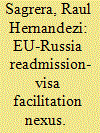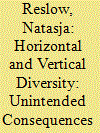| Srl | Item |
| 1 |
ID:
100925


|
|
|
|
|
| Publication |
2010.
|
| Summary/Abstract |
Despite the lack of cooperation in other issue areas, EU-Russia migration cooperation has been fruitful to the present. The internal security driven EU migration policy towards third countries has so far led to the conclusion of readmission and visa facilitation agreements as policy outputs in Russia. This article looks at the patterns of policy convergence between the EU and Russia in light of the Common Space of Freedom, Security and Justice in the fields of irregular and regular migration. It claims that Russia's leverage vis--vis the Union shaped the migration policy output, in which the visa facilitation regime was introduced as an incentive to readmission. Finally, it stresses the role of Russia in shaping the EU external dimension towards Eastern European countries, once the readmission-visa facilitation nexus has been institutionalised to all the countries in the area.
|
|
|
|
|
|
|
|
|
|
|
|
|
|
|
|
| 2 |
ID:
142633


|
|
|
|
|
| Summary/Abstract |
Motivated by neoliberal normativism, the ENP drew on a now outdated mix of political and economic reasoning that does not reflect recent scientific evidence on regional development, and is compromised by having been formulated at arms-length from implementing contexts. An expansion of the ENP discourse that builds upon research findings and sustained feedback with field experts in neighbourhood countries is thought to increase the probability of long-term policy success. Rather than trade liberalisation as the primary stimulant, the results specifically suggest innovation support as the default strategy, and migration policy structures to back labour and capital flows.
|
|
|
|
|
|
|
|
|
|
|
|
|
|
|
|
| 3 |
ID:
144734


|
|
|
|
|
| Summary/Abstract |
Since 2013, the European migration and asylum regime has entered a phase of crisis, which reveals the deep interdependencies between its different components (including intra-EU mobility) and the unbalanced nature of its normative foundations. This original structural fragility had not fundamentally compromised the overall functioning of the regime until two major exogenous factors (the economic crisis, with its asymmetrical impact on the eurozone, and the wave of political instability and conflicts on the southern shore of the Mediterranean) brought its intrinsic limits to the point of rupture. The ongoing, highly contentious process of reform of the European migration and asylum regime is an unprecedented and crucially important test of the capacity of one the European Union’s key sectors to evolve under pressure and to adapt to a rapidly and deeply changing geopolitical, economic and demographic environment.
|
|
|
|
|
|
|
|
|
|
|
|
|
|
|
|
| 4 |
ID:
163651


|
|
|
|
|
| Summary/Abstract |
Unintended consequences arising from EU external migration policy are a result of the multi-actor nature of this policy and of policy interactions. In addition, scholars face serious methodological challenges in establishing what the EU’s ‘intent’ is in external migration policy and, therefore, in determining which consequences are intended and which are unintended. The literature on the implementation and evaluation of EU external migration policy is in its infancy, and future work should take into account all policy outcomes – both those that were intended and those that were not.
|
|
|
|
|
|
|
|
|
|
|
|
|
|
|
|